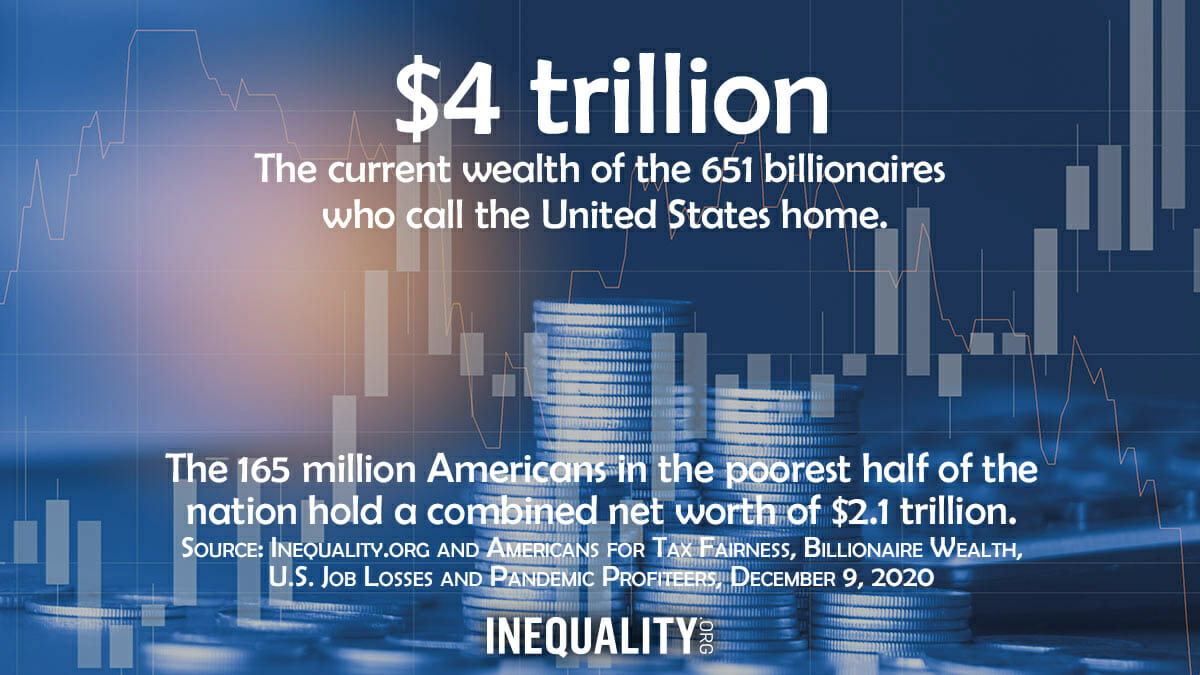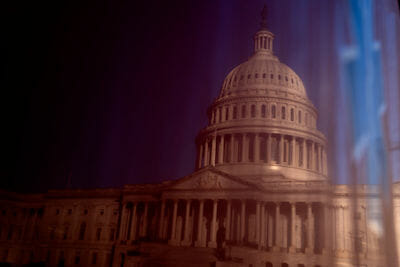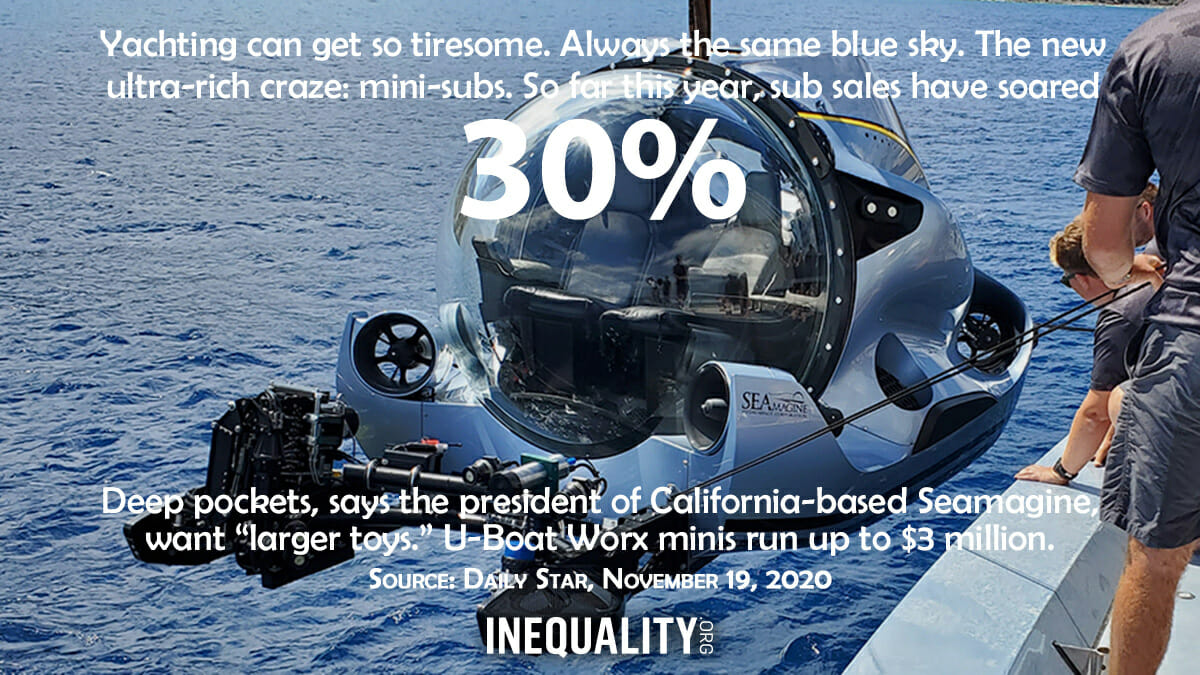| THIS WEEK |
Back in 2004, the Brazilian photographer Tuca Vieira shot what may well be the world’s most famous photo of inequality, a now iconic aerial image of a São Paulo shantytown butted right next to one of the city’s poshest neighborhoods. Late last month, Vieira and the noted South African-based photographer Johnny Miller went back aloft to reshoot the same shot.
We’ve just published Miller’s reflections on that experience online. We think his observations will hit home with all our readers — because stark inequality has gone worldwide, with the latest evidence coming from our Inequality.org update on U.S. billionaire earnings. Our richest have now gained over $1 trillion since the pandemic first hit hard, enough to send a $3,000 stimulus check to every one of America’s 330 million people.
Our U.S. Senate majority leader, meanwhile, remains dead-set against sending out the emergency relief Americans need. Whatever happened to holiday spirit? And speaking of holidays, we’ll be taking our annual year-end break the next two weeks. Please stay safe and join us in January for what we hope will be the year of egalitarian renewal we all so long for!
Chuck Collins, for the Institute for Policy Studies Inequality.org team |
|
| |
|
| INEQUALITY BY THE NUMBERS |
 |
|
|
|
| |
|
| FACES ON THE FRONTLINES |
 |
| Two Strategists in the Fight Against Inequality |
| Critics who bemoan Black Lives Matter like to wonder “why today’s activists can’t be more like Martin Luther King?” But back in King’s 1966 heyday, 63 percent of Americans viewed him unfavorably. That stat, says Ben Phillips, author of the just-released book How to Fight Inequality, speaks to “the true lesson of Dr. King and other change-makers”: that narrowing our economic divides will require us “to disrupt, to confront power, and to take on prevailing norms.” Phillips, co-founder of the international Fight Inequality Alliance, shares more thoughts on how to make real change in a fascinating Inequality.org “co-interview” with renowned tax-haven muckraker Nick Shaxson. |
|
| |
|
| WORDS OF WISDOM |
 |
|
|
|
| |
|
PETULANT PLUTOCRAT
OF THE WEEK |
 |
| A Lesson for Everyone Who Still Trusts Billionaires |
|
In May last year, British billionaire Sir James Ratcliffe — a prominent backer of the Brexit move to exit the European Union — pronounced that the UK would thrive outside the EU because “we don’t need people in Europe telling us how to manage our country.” What the British people definitely do need: no more billionaires telling them how to run their country. Ratcliffe has just announced that his Ineos corporation isn’t going to be building a widely ballyhooed new auto plant in Wales after all. Instead he’s going to locate that new operation right in the heart of the European Union. Turns out that a former Mercedes-Benz factory in eastern France has now become available, “a unique opportunity,” says Ratcliffe, “that we simply could not ignore.” But Ratcliffe apparently has no problem ignoring either the 500 jobs Wales is now losing or the British taxes he used to have to pay. This past September, Ratcliffe changed his official domicile to Monaco, a move expected to save him $4 billion in overall personal taxes. His current net worth: $28.1 billion. |
|
| |
|
| BOLD SOLUTIONS |
 |
| In D.C., a Decade of Progressive Pressure Pays Off |
| A surprising thing is happening this week in Washington, D.C.: Congress is on the verge of actually passing a piece of meaningful progressive legislation. Republican and Democratic members of Congress have come together over concerns around terrorist funding networks, financial corruption, and tax dodging and are moving along a Corporate Transparency Act that takes an important step toward eliminating shell corporations. The Financial Accountability and Corporate Transparency (FACT) Coalition, with the Institute for Policy Studies inequality program a founding member, has been working diligently since 2011 to pass this key legislation. Inequality.org’s Chuck Collins has more on the significance of this impending legislative win. |
|
| |
|
| GREED AT A GLANCE |
 |
|
|
|
| |
|
| TOO MUCH |
 |
| Young ‘Self-Made’ Billionaire, Old Bogus Claim
|
| Myths die hard, especially when the myths in question serve to prop up the legitimacy of the richest among us. And the myth these richest hold dearest: that their grand fortunes represent a fitting reward for smarts and hard work. Wall Street has just juiced this deeply cherished myth with a stock public offering that’s created “the world’s newest and youngest self-made billionaire.” Meet Austin Russell, the 25-year-old CEO at Luminar, a fledgling firm that’s outfitting self-driving cars with laser tech. Russell holds about a third of Luminar’s stock. After the start of public trading earlier this month, the stock’s soaring value boosted Russell’s net worth to $2.4 billion. All these billions, business analysts are gushing, couldn’t possibly be going to a smarter guy. None of this gushing over young Russell should particularly surprise us. Commentators are always rushing to find brilliance in billionaires — and billionaires seldom shy from supplying the evidence. Inequality.org co-editor Sam Pizzigati has more. |
|
|
|
| |
|
| MUST READS |
This week on Inequality.org
Manuel Perez-Rocha, Biden’s Top Trade Official Should Work to Protect Governments From the Rising Number of Corporate Lawsuits. In 2020, foreign investors filed at least 51 known cases demanding huge sums from governments struggling to fight a historic pandemic.
Johnny Miller, Sixteen Years Later, a Helicopter Returns to the Site of the ‘World’s Most Famous Photograph of Inequality’. Reflections from photographers with a shared passion for creating provocative images of spatial inequality.
Chuck Collins, Billionaire Wealth, U.S. Job Losses and Pandemic Profiteers. An update revealing that U.S. billionaire total wealth now stands at $4 trillion, up over $1 trillion since the pandemic hit.
Elsewhere on the Web
Chuck Collins and Omar Ocampo, Billionaires made $1tn since Covid-19. They can afford to protect their workers, Guardian. Who’s generating new pandemic-time billions for billionaires? Credit, in countless cases, frontline retail, health care, and food workers, most all underpaid and under-protected from the coronavirus.
Andrew Atkinson, UK Urged to Levy $350 Billion Wealth Tax to Fund Pandemic, Bloomberg. A study by a widely respected UK Wealth Tax Commission is proposing a one-off 5 percent levy on assets over £1 million for couples (about $1.32 million).
Shaylyn Romney Garrett and Robert Putnam, Why Did Racial Progress Stall in America? New York Times. Growing inequality nurtures a self-centeredness that undercuts any sense of shared community.
Vanessa Williamson, Closing the racial wealth gap requires heavy, progressive taxation of wealth, Brookings. The 400 richest U.S. billionaires hold more wealth than all 10 million Black American households combined.
Robert Reich, Biden Says He’ll Take on Inequality. Good! You Need to Hold Him to It, Common Dreams. Wealth flows from power and power from wealth. That means reversing structural inequalities requires altering the distribution of power.
Frank Manheim, Low taxes on corporations and higher taxes on the execs who run them could stimulate US manufacturing, The Hill. America’s astoundingly high top incomes have a negative effect on our national productivity and grow our nation’s unsupportable inequality.
John Cassidy, The Billionaires Who Profited from the Pandemic Should Help Pay for Our Recovery, New Yorker. A new UK proposal suggests that a onetime pandemic levy on a country’s wealthiest citizens could be the most practical and ethical way to pay for stimulus plans.
Vivian Ho, 'Flexing their power': how America’s richest zip code stays exclusive, Guardian. Atherton — home to Silicon Valley heavyweights like Eric Schmidt and Nick Clegg — may not technically be a gated community. But its laws create walls of their own.
Andrew Hoffman, A better way for billionaires who want to make massive donations to benefit society, The Conversation. If major donors truly want to help create a better society, they should use their political power to insulate policy making from the influence of folks like themselves.
Simon Torracinta, The Gadfly of American Plutocracy, Boston Review. A timely and engaging review essay on a new bio of the iconoclastic Gilded Age economist Thorstein Veblen.
Valentin Lang, The economics of the democratic deficit: The effect of IMF programs on inequality, Review of International Organizations. International Monetary Fund programs are driving our income gaps wider. |
|
| |
|
| A FINAL FIGURE |
 |
|
|
|
| |
|
|